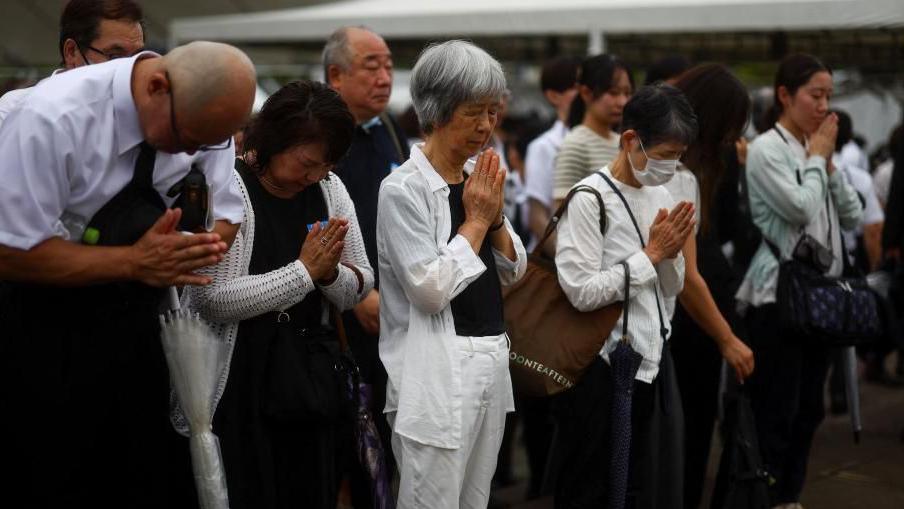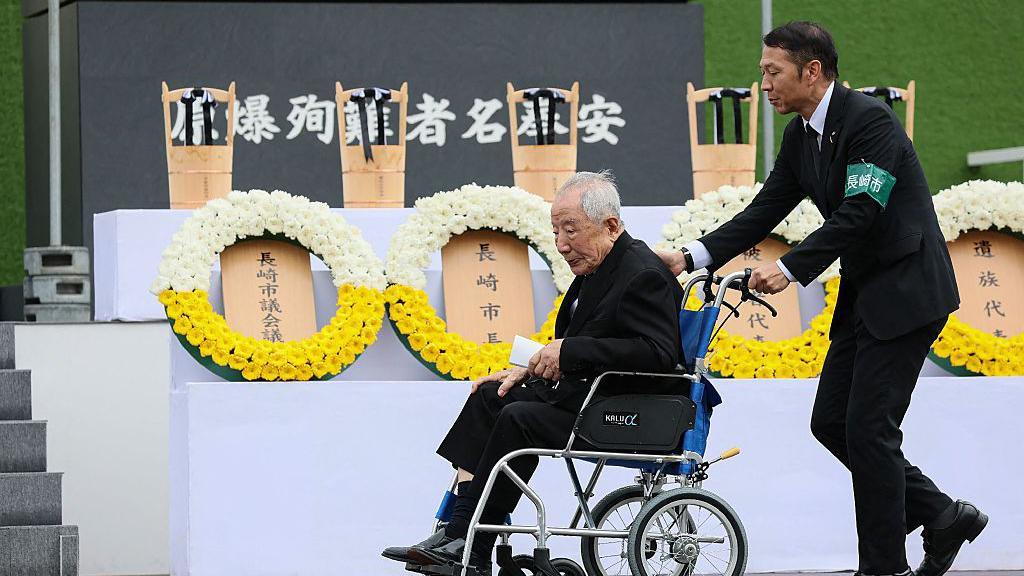Nagasaki mayor warns of nuclear war 80 years after atomic bomb attack

Attendees at Saturday ceremony
- Published
The mayor of Nagasaki has appealed for an end to the wars raging in the world on the 80th anniversary of the US atom bomb attack which destroyed the Japanese city.
"Conflicts around the world are intensifying in a vicious cycle of confrontation and fragmentation," Shiro Suzuki said in a Peace Declaration at a solemn ceremony to mark the event.
"If we continue on this trajectory, we will end up thrusting ourselves into a nuclear war."
The attack on 9 August 1945, which analysts say hastened the end of World War Two, killed an estimated 74,000 people.
In the years that followed many survivors suffered from leukaemia or other severe side effects of radiation.
Saturday's ceremony came a few days after the commemoration of the first atomic bombing, which targeted the Japanese city of Hiroshima 80 years ago on 6 August, killing an estimated 140,000 people.
The Nagasaki bomb, bigger and more powerful, wiped out whole communities in seconds.
The commemoration in the rebuilt city began with a moment of silence.
Nagasaki's twin cathedral bells also rang in unison for the first time since the attack, in a message of peace to the world.
As part of Saturday's ceremony, water offerings were made in a moving and symbolic gesture - 80 years ago victims whose skin was burning after the blast had begged for water.
Today participants of different generations including a representative of the survivors offered water in a show of respect to those who perished in nuclear fire.
"On 9 August 1945 an atomic bomb was dropped on this city," Suzuki said in the declaration.
"Now, 80 years since that day, who could have possibly imagined that our world would become like this? Immediately cease from disputes in which 'force is met with force'."
Bomb survivor Hiroshi Nishioka, 93, who was just 3km (1.8 miles) from the spot where it exploded, told the ceremony of the horror he had witnessed.
"Even the lucky ones [who were not severely injured] gradually began to bleed from their gums and lose their hair, and one after another they died," he said, as quoted by AFP news agency.
"Even though the war was over, the atomic bomb brought invisible terror."

Hiroshi Nishioka was a teenager when the atom bomb landed on Nagasaki
Nagasaki resident Atsuko Higuchi, 50, told AFP it "made her happy" that the city's victims were being remembered.
"Instead of thinking that these events belong to the past, we must remember that these are real events that took place," she added.
Among the bloodiest conflicts currently raging in the world are the war between Russia and Ukraine, and that between Israel and the Gaza-based group Hamas.
There was controversy last year when Nagasaki declined to invite Israel to the annual commemoration, citing security concerns.
This year the mayor said Israel had been invited, as well as Russia and its ally Belarus, external which had been shunned since Russia's invasion of Ukraine in 2022.
An international agreement banning nuclear weapons, the Treaty on the Prohibition of Nuclear Weapons, came into effect in 2021.
More than 70 countries have ratified the treaty but nuclear powers have opposed it, arguing their nuclear arsenals act as a deterrent.
Japan has also rejected the ban, saying its security is enhanced by US nuclear weapons.
Hiroshima and Nagasaki: Are they safe now?